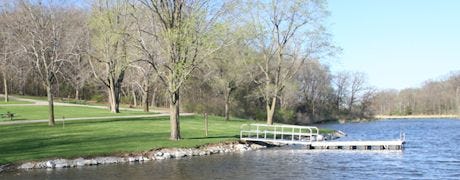
Whether it's running or cycling on a public trail, fishing, swimming or boating on a lake or river, camping in a state or county park, or just enjoying the great outdoors, Iowa's natural resources impact its citizens one way or another. Iowa State University Economics Professor Dan Otto pointed this out at the 2012 Rally for Iowa's Outdoor Legacy Conference in Des Moines.
Otto recently completed a study to put a value on Iowa's natural resources, including the economic impacts, health benefits and quality of life. "There are the amenities available that raise the quality of life," he says, noting local parks, lakes and walking trails. "It helps keep recreation local."

ISU economics professor Dan Otto addressed the importance of Iowa's natural resources have in our economy and health. Bodies of water may be the most valuable, as 46% of Iowans fish at least once a year, and 60% visited an Iowa lake for a day in 2009.
However, it is important to use available land properly. Three quarters of the state is used for crops, and 88.7% is privately owned farmland, Otto notes. "We are becoming a more urbanized state," he adds. "We have very small public land area available. What we have available is very important for agriculture."
Economic benefits
Bodies of water may be the most important part. "These are the venues where a lot of the recreation takes place," Otto says, noting multiple uses like fishing, boating and swimming. “Forty-six percent of the population have gone out and fished at least once a year." This follows a nationwide love of being near water. A survey shows 60% of Iowans took at least one day trip to an Iowa lake in 2009. "There has been a growth from 2002 to 2009 of about 33% in participation," Otto notes, adding conservation efforts have helped. Three of the four lakes with the biggest percentage increases in usage were lakes which underwent restoration since 2002-05. "There has been a sustained effort to improve the quality of lakes and the quality of water in the lakes."
~~~PAGE_BREAK_HERE~~~
This study also shows Iowa's lakes brought 12 million visits and $1.21 billion of direct annual spending, accounting for 14,766 jobs. But parks are also a significant contributor, many with lakes themselves. State parks accounted for $785.9 million in direct annual spending, 13.7 million visits a year, along with 7,472 jobs. "Most of these jobs and income are in the retail and service areas," Otto explains, noting this includes boat, cabin and equipment rentals.
It helps with Iowa's rural population being close to these areas. "Fishing and hunting are a major activity here in the state," he says. "We are very close to nature." However, multiple-use trails provide recreation for other areas. "They're concentrated around the metro area," he says. Iowa has 58 trails with 1,150 total miles, creating 169 jobs and 1.9 million users. For biking alone, these trails brought $364.8 million in direct annual spending, according to a separate UNI study. "This is just one aspect of trail usage," Otto notes.
Health benefits
The total amount of income for 2011 in Iowa's outdoor recreation was $717 million. However, Otto says there are other benefits. "Numerous studies have identified that increased access to outdoor activity will increase health and decrease health costs." This also improves the quality of life in the community. "People want to have access to healthy outdoor recreation activities," Otto explains. "Lakes, stream acres, trail miles. These things matter in terms of how people choose where they live, and benefit the state economy in the process."
Therefore, it is crucial to maintain these natural resources through projects like REAP and SCS, which invested $7.5 million in soil erosion control in Iowa in 2011, Otto says. This also includes dredging lakes. Otto points out Storm Lake, which expects 148,000 new visitors after its dredging. "The results have been pretty astounding." With production pressure on Iowa land, he says it's important to take care of what resources are available. "Statewide spending on natural resources generates statewide economic benefits," he says. "Outdoor recreation is a large and important business in rural Iowa."
About the Author(s)
You May Also Like






